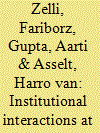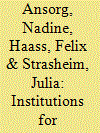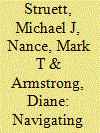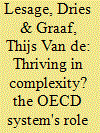|
|
|
Sort Order |
|
|
|
Items / Page
|
|
|
|
|
|
|
| Srl | Item |
| 1 |
ID:
117947


|
|
|
|
|
| Publication |
2013.
|
| Summary/Abstract |
This article takes stock of the current debate on regime complexes. The specific relevance of such complexes for global governance is best grasped if these complexes are understood as systems that relate and organize their elemental institutions. They emerge from activities of relevant international actors, in particular the member states of their elemental institutions, as well as from interactions among these institutions. Regime complexes establish interinstitutional competition, which may lead to open conflict and turf battles, but may also produce a well-established division of labor among the elemental institutions. As they provide forum-shopping opportunities for actors, regime complexes put overlapping governance institutions under continuing competitive pressure and they do not necessarily predominantly benefit the most powerful states. In order to increase the coherence and effectiveness of global governance efforts, the management of regime complexes will become an increasingly important task of global governance.
|
|
|
|
|
|
|
|
|
|
|
|
|
|
|
|
| 2 |
ID:
117946


|
|
|
|
|
| Publication |
2013.
|
| Summary/Abstract |
This article argues that institutional interactions that cut across the domains of trade and environment are embedded in overarching norms that shape their evolution and impact. In making this argument, it analyzes three cases of such interactions within the climate change and biosafety regime complexes: those relating to trade-related climate policies and measures, forest carbon sinks, and trade in genetically modified organisms. The analysis highlights the dominance of liberal environmentalism (a set of global norms promoting economic efficiency and environmental improvements through market-based mechanisms) in shaping institutional interactions within these regime complexes, even as liberal environmentalism is contested by key actors. This, in turn, has implications for effective management of institutional interlinkages within regime complexes in global environmental governance.
|
|
|
|
|
|
|
|
|
|
|
|
|
|
|
|
| 3 |
ID:
117939


|
|
|
|
|
| Publication |
2013.
|
| Summary/Abstract |
IN DIVIDED SOCIETIES, CHARACTERIZED BY AN ANTAGONISTIC SEGMENTATION
among identity groups, formal state institutions are of paramount importance in regulating intergroup conflict. Institutional reform is thus an
appealing option to shape such state institutions-the system of government, electoral systems and party regulations, territorial state structure, the
judiciary, and the security sector-in order to promote sustainable peace
and prevent the occurrence or recurrence of violent conflict. However,
research is far from having arrived at a consensus about what institutions
work where and how. Is the choice of institutional design in a postwar situation determined at all by expected political utility? What distinguishable
effects can different designs have under what conditions? How do institutions interact-what role does the "concert of institutions" play in the
impact on sustainable peace?
|
|
|
|
|
|
|
|
|
|
|
|
|
|
|
|
| 4 |
ID:
117937


|
|
|
|
|
| Publication |
2013.
|
| Summary/Abstract |
THE DISTINCTION BETWEEN A PUBLIC AND A PRIVATE SPHERE IS ESSENTIAL TO
politics. The public sphere is commonly associated with the state and politics whereas the private sphere encompasses markets and civil society.
Political power and state sovereignty rest on "a set of institutionalized
authority claims."
1
The sovereign state's authority claim over its population
imparts it with metapolitical authority. That is, the governing bodies of
states claim to have, and are recognized as having, the authority to define
what is public (and thus political) and what is private (and thus beyond
political authority).
2
The range of activities over which political bodies can
legitimately exercise authority may vary over time and between states. For
instance, the authority claims of modern welfare states are far more extensive than those of medieval or nineteenth-century states, asformerly private
aspects of people's lives have become included in the public realm.
|
|
|
|
|
|
|
|
|
|
|
|
|
|
|
|
| 5 |
ID:
117945


|
|
|
|
|
| Publication |
2013.
|
| Summary/Abstract |
Maritime piracy is one of the oldest subjects of international law and recently it has reemerged as a serious threat to commerce and security. While states have become more engaged in punishing and preventing piracy, efforts as a whole have been poorly organized, ad hoc, mostly unilateral, slow to develop, and only minimally effective. This is true despite the existence of a regime complex that supposedly promotes effective cooperation on the issue. What explains the insufficient response to this rising economic and security threat? This article argues that the regime complex itself is a major part of the problem. It examines specifically four core elemental regimes that are identifiable by their key texts or organizations: the UN Convention on the Law of the Sea, the Convention for the Suppression of Unlawful Acts Against the Safety of Maritime Navigation, the International Maritime Organization, and the International Maritime Bureau. This analysis adopts a perspective that emphasizes how these different legal and organizational institutions shape actors' understandings of piracy, and thus their interests in it, in conflicting ways. Different elemental regimes push different actors toward different behaviors.
|
|
|
|
|
|
|
|
|
|
|
|
|
|
|
|
| 6 |
ID:
117942


|
|
|
|
|
| Publication |
2013.
|
| Summary/Abstract |
Recurrentfood price crises, coupled with the steady deterioration of world
food security overthe pasttwo decades, have prompted effortsto reform
the global governance of food security. This article argues that diverging
rules and norms across the elemental regimes of agriculture and food, international trade, and human rights over the appropriate role of states
and markets in addressing food insecurity are a major source of transnational political conflict. It analyzes(1)the role of normsin the construction
of the international food security regime; (2) the transition from an international food security regime to a regime complex for food security; and
(3)rule and norm conflicts within thisregime complex. It concludes with a
discussion ofthe impacts of diverging norms on the politics ofregime complexity and its policy implications for current efforts to reform the global
governance of food security.
|
|
|
|
|
|
|
|
|
|
|
|
|
|
|
|
| 7 |
ID:
117940


|
|
|
|
|
| Publication |
2013.
|
| Summary/Abstract |
Understanding the impact ofregime complexes on global governance calls
for creative policy thinking. This introduction provides a new and more
precise definition of the concept of regime complex. It also suggests specific tools to characterize regime complexes and analyze their impacts on
global governance. The articles in this issue deepen the analytical understanding of complexes by examining concrete examplesin various domains
of global governance such as piracy, taxation, energy, food security, emissions reduction, carbon sinks, biosafety, and refugee governance. In addition to providing an in-depth description of a variety of different regime
complexes, this issue is innovative on three accounts: (1) it presents complexes as both barriers and opportunities for global governance and gives
explanations for these diverse outcomes; (2) it shows how a broad spectrum of actors is necessary for understanding the creation and evolution
of complexes; and (3)it qualifiesformer claimsto the effectthat only powerful actors can impact regime complexes. institutional density.
|
|
|
|
|
|
|
|
|
|
|
|
|
|
|
|
| 8 |
ID:
117943


|
|
|
|
|
| Publication |
2013.
|
| Summary/Abstract |
The existing literature on regime complexity has generally focused on its impact on the behavior of states; in contrast, this article explores its implications for international organizations. Many organizations within the UN system were established in the aftermath of World War II, at a time when they held a de facto monopoly in a given policy field. Gradually, however, institutional proliferation has created a range of institutional overlaps that may have complementary or competitive relationships to the referent organization of the original regime. Developing the concept of challenged institutions, this article explores how international organizations are affected by and strategically respond to growing institutional competition. Through a case study of the Office of the UN High Commissioner for Refugees' response to an increasingly competitive institutional environment, it argues that the concept of challenged institutions highlights the dilemmas faced by multilateral organizations in a rapidly changing landscape of global governance.
|
|
|
|
|
|
|
|
|
|
|
|
|
|
|
|
| 9 |
ID:
117944


|
|
|
|
|
| Publication |
2013.
|
| Summary/Abstract |
The purpose of this article is to reveal how two organizations from the OECD system-the Organisation for Economic Co-operation and Development and the International Energy Agency-are maneuvering strategically to retain their focal places in the regime complexes that developed around taxation and energy, respectively. It argues that their bid for leadership and centralization is built on the comparative advantages they enjoy as institutions; namely, their historically accumulated expertise and distinct working methods, their close ties with the Group of 8, and their rapidly developing relationships with emerging powers. Notwithstanding these institutional assets, a revision of the OECD's membership could further cement and legitimize the central role of the OECD system in these regime complexes.
|
|
|
|
|
|
|
|
|
|
|
|
|
|
|
|
|
|
|
|
|